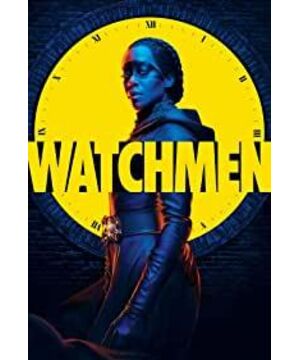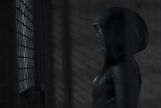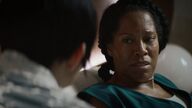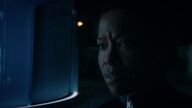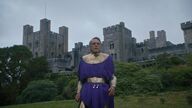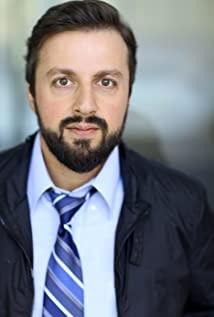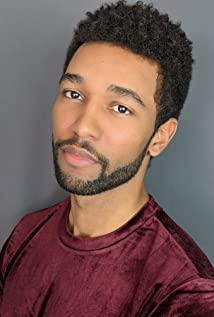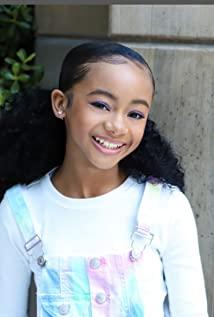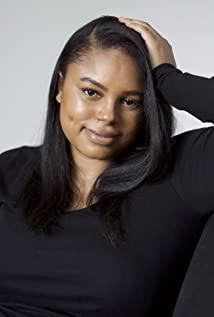At the end of HBO's "Watchmen," creator Damon Lindelof once again provokes audiences with his signature bewitching moment. After losing her husband, Dr. Manhattan, Ms. Dark Night swallows an egg that is implied to have her husband's superpowers, and then tries to walk on water. At the moment when the foot touched the water, the picture darkened, and then the whole play ended, leaving only a series of question marks in the audience's mind.
Of course this is Damon Lindelof's habit of throwing out mysteries and never solving them. In his revamped "Watchmen," there are similar moments in abundance, turning the entire episode into one giant interactive crossword puzzle. For viewers who know him well, it's certainly a reward for intelligence. And for fundamentalists who see the original comics as timeless classics, it becomes a blasphemy.
As a comic adaptation work, the new version of "Watchmen" has achieved the ultimate in the subversion and deconstruction of the classics. It was a valiant attempt to leave its peers far behind, occasionally turning back with a mocking smile.
He saw the twentieth century for what it really was and decided to imitate it and become a microcosm of it.
Bringing the "Watchmen" story to the screen is absolutely insane, even in Hollywood. There have been a lot of people who have tried to do this, including famous directors like Terry Gilliam and Darren Aronofsky, but they have all failed. It was not until 2009 that Zack Snyder's film version restored that cold and cruel world for the first time. However, after the film was released, it was controversial and did not achieve the desired results in terms of box office and word of mouth. On the one hand, it can be attributed to Zack Snyder's overly personal image style, and on the other hand, the original profound thoughts are too broad and profound.
Alan Moore's original is undoubtedly the brightest jewel in the comics crown. Under his pen, the masked superhero ushered in a true coming of age ceremony. They are no longer a bunch of masquerades in straitjackets playing hide-and-seek with bad guys, but some kind of bond with the real world. Political and ideological oppositions are introduced into the story, and painful pasts afflict each individual. That's a projection of our real world.
The original story takes place in 1985, the threat of nuclear war is looming, and the "doomsday clock" is about to reach midnight. After the "Kean Act" regulations were promulgated, most superheroes were forced to choose to retire. When a hero named Comedian is murdered, his former colleague Rorschach decides to find out the truth himself (a man with severe social disabilities and racist tendencies). As the investigation deepens, more and more superheroes are involved. Silk Soul II, Night Owl II, Doctor Manhattan, Pharaoh, everyone is talking about their past and how to understand the world in front of them. Until the end, the pharaoh used his shocking conspiracy and the price of half New York to prevent the outbreak of nuclear war, and peace came in a lie.
The story of "Watchmen" is flawless, and it has trampled many other works under its feet and has become the bible of countless people, including Damon Lindelof. He first got the manga from his father the year his parents divorced and read it over and over for many years after. He saw his own shadow in those failed heroes, and after stepping into Hollywood, he moved to bring it to the screen.
Damon is by no means the best candidate for a videotaped Watchmen, and his previous work has always been controversial. Lost , which he directed, became the biggest unfinished project in American TV history, and The Leftovers didn't make any waves because of its obscure narrative. The film projects he co-wrote, Prometheus and Star Trek Into Darkness , were spurned by series fans, who thought he had tarnished the originals. Of course there are people who like his style and see him as one of the few cleansers in an increasingly stagnant Hollywood.
It's hard to come up with a single word to define exactly how Damon's "Watchmen" relates to the original. Modified, not exactly. It doesn't seem right to continue. It's vaguely in between, and watching it feels like reuniting with an old lover you haven't seen in years. You can inadvertently see the familiar smile on her face, but more often you realize that everything has changed.
The new version of Watchmen takes place in 2019, 34 years after the original. Because of the pharaoh's conspiracy, the fragile peace is still maintained, and the threat of nuclear war has been gradually forgotten like superheroes. Because of a terrorist attack called "White Night Incident" many years ago, the police became a vulnerable group and had to wear masks to hide their true identities, and it was the "Seventh Knights" who attacked them, a group with Luo White supremacist racist in summer mask. The story also begins with a murder in which a white sheriff is brutally hanged from a tree. There seems to be a huge conspiracy behind all this, and the new character Lady Dark Night decides to find out the truth.
The new "Watchmen" has an unfamiliar and familiar opening, but then it boldly cuts from the past and goes in a completely different direction.
You are forced to be with me, and each of us is alone.
For any viewer familiar with its predecessor, every minute of the new Watchmen is filled with confusion. The damp and cold city is gone, the muttering monologues are gone, there is no sense of oppression of despair, the whole world is too normal. The original hero seems to have changed into amnesia at the same time, and lived a completely different life. Silk Soul becomes a government employee hunting down superheroes; Pharaoh is "trapped" in a castle, playing house games with his servants; Doctor Manhattan doesn't appear until the penultimate episode, and the reason for his disappearance is unexpected Is to enter a marriage, even willing to give up their own strength for this. Is this really the world of the watchmen?
Of course, if you look carefully, you can still find clues about the connection. The sudden "octopus rain" is a continuation of the pharaoh's shocking lie; the police badge that fell on the ground when the sheriff died paid tribute to the joker's bloody badge; Rorschach's diary was published in the magazine, which to some extent led to The rise of the Seventh Knights; even Dr. Manhattan's time-jump in an episode is narrated in exactly the same way as his autobiography in the comics.
If it's just this superficial split, the new version of "Watchmen" is at best a clever sequel. What really brought it to the top of the controversy was Damon Lindelof changing its ideological core from an ideological confrontation under the nuclear threat to a racist struggle for power.
Hooded Judge, a fringe character with only a few strokes in the original, his true identity leaps to the heart of the story's mystery. The Hooded Judge was the first superhero to wear a mask, and his actions inspired other Watchmen. In the series, his real identity is set as the victim of the Tulsa genocide in 1921, and the town where the massacre occurred is also the location of the new version of the story. Persecuted as a black man, he finally put on a mask and carried out "revenge". The sheriff was murdered because of his secret identity as a racist KKK member.
The villains in the series are all set to be racists without exception. The Seventh Knights are white supremacists and hate blacks; "Zhao Wei" is the illegitimate child born by the victims of the Vietnam War who stole the pharaoh's genes and tried to In retaliation for the crimes of aggression committed by whites during the Vietnam War. The racial identity has become the most basic motivation for their behavior, and the target they compete for is the power of Dr. Manhattan, which not only has no racial identity, but its carrier cannot even be regarded as a human being.
From ideological confrontation to interpretation of racial discrimination, does the new version of "Watchmen" have a narrow theme? Maybe yes, but it's also more in line with today's era. Today is not 1985, the era of the Cold War and bipolar confrontation is a thing of the past. Whether in the East or the West, individualism will inevitably rise after the decline of totalitarianism, and skin color and race are inescapable marks on everyone. It's more private, smaller, and more modern.
In times like these, the lines between superheroes and ordinary people have become even more blurred. The most interesting setting is that in the world of 2019, whether it is a policeman, a villain or a superhero, all need masks to protect their true identity, and masks and superpowers are no longer a privilege. The original "who watches the watchmen" has become "who is the watchmen". After putting on the mask, everyone pretends to be a watchman, and the individual's desire is maximized.
If you dig a little deeper, you can still find that the new version of "Watchmen" has carried out some kind of reinterpretation of the core of the original. Whether it is racial confrontation or ideological struggle, the core of it is the struggle for power and power, and the skin color and mask are just the most superficial layer of lies. Whereas in the original it was an abstract nuclear force, in the new version it was a concrete individual, namely Dr. Manhattan. He was born out of a struggle between centralized powers (Dr. Manhattan is the product of a nuclear accident), and ultimately falls back to being a solitary individual and trying to relinquish that power in love.
Ahead of the series' official release, Damon used the Old Testament and New Testament to make an analogy between his own "Watchmen" and the original. The Old Testament belongs to God, and the New Testament belongs to man. Alan Moore's "Watchmen" belongs to the grand ideology of the old days, and Damon's "Watchmen" belongs to everyone today.
Come on, mature, our new world doesn't need this superficial heroism.
After making such a huge change, the reviews for the new version of Watchmen are so polarized. People who hate it can give 10,000 reasons, such as forced political correctness, narrow vision, or a protracted plot with a weak ending. And there is only one reason for people who like it. The world needs an alternative comic work, and it needs some different superheroes.
Never before has superheroes held such a prominent place in popular popular culture as they are today. Wearing tights, armor and masks, people from all walks of life dominated the box office charts and became national idols. But behind the prosperity, we can see more and more homogeneous stories and more conservative creative concepts. Defeat the bad guys again and again, save the world again and again, change the roles, change the time, but next time will have a bigger scene and more explosions than this time. With its so-called ten-year layout and 22 movies, Marvel has demonstrated how much power a franchise's fans can have, and how much fanatical waves they can make. However, it has also gradually become a slave watch for fans, and it is gone on the road to curry favor with them.
Just look at the current state of Disney's Star Wars franchise next door. ' The Rise of Skywalker ' was a word-of-mouth and box-office fiasco due to its overused sentimentality and illogical plot, while The Mandalorian on Disney+ turns out to be the baby "Baby Yoda". If Disney could have decided to break the old and create the new at the beginning of the new trilogy, or insisted on the reforms in "The Last Jedi" ( The Last Jedi ), it would not have ended up in the tragic situation of today. Another example is the previously ambitious DC Universe. Warner executives, fearful of fans' polarizing comments on Zack Snyder's sharp personal style, revamped "Justice League " just before its release , leading to the complete collapse of the DC universe.
While explaining why he made such a bold overhaul in The Last Jedi, director Rian Johnson said it was a "mistake" to cater to fans rather than challenge them. To some extent he was right. Just because fans have power doesn't mean fans are gods. Without challenging fans to change, our Batman will never have a midlife crisis, and our Superman will always be a brute force alien. Who would want to see the Avengers battle supervillains for the next two decades, or the Empire and the Rebels to battle endlessly across the galaxy.
Challenging fans to change was Alan Moore's response to the traditional comics world with "Watchmen" 35 years ago, and today Damon Lindelof tries to respond again with a sequel. This is a kind of inheritance, just like the egg in the show that contains the power of Dr. Manhattan, from the old generation to the new generation. Swallow it and try to walk on the surface without fear of falling into it.
This article was first published on the official account of Deep Focus DeepFocus, and the text and pictures have been slightly changed.
View more about Watchmen reviews


